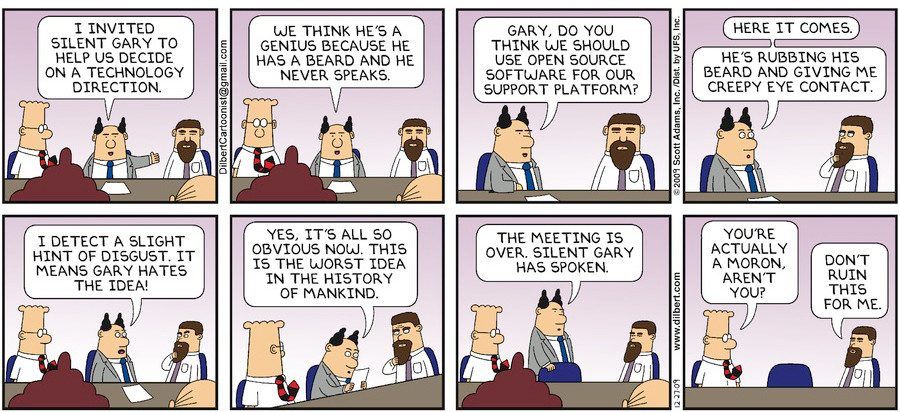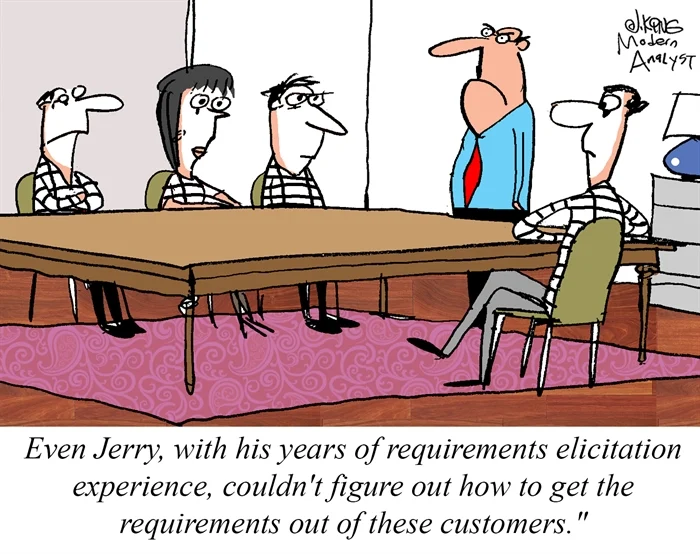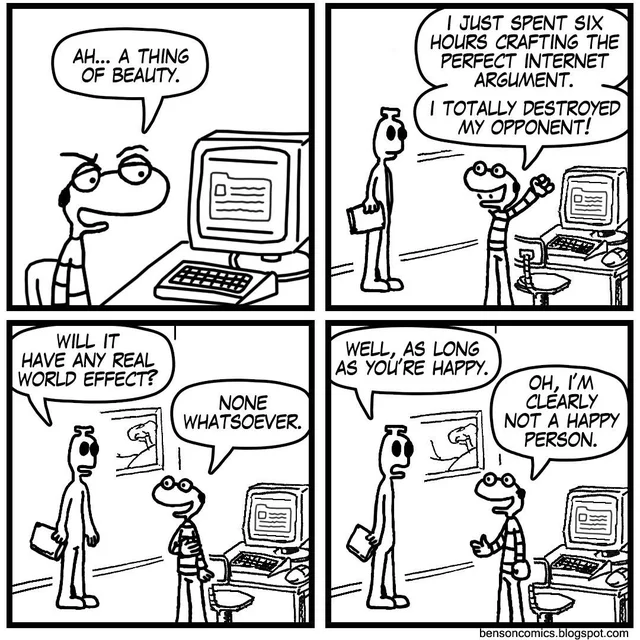The silent majority
Table of Contents
The “silent majority” was used by President Richard Nixon during his presidency and his campaign. In this usage, it referred to those Americans who did not join in the large demonstrations against the Vietnam War at the time, who did not join in the counterculture, and who did not participate in public discourse. Nixon, along with many others, saw this group of Middle Americans as being overshadowed in the media by the more vocal minority.
We're not talking about politics. This interesting concept of the majority being overshadowed by the vocal few is quite fascinating and holds true in software engineering.
In software development, the silent majority are the engineers who write the code, debug the programs, and solve the complex issues behind the scenes. They do not participate in controversial discussions about Visual Basic or Pascal — they just do their work in those languages without even knowing that there’s so much controversy surrounding their language of choice.
Without this silent majority, many projects would, in fact, grind to a halt. It is often their quiet diligence that keeps a project on track and prevents it from falling apart.
There also seems to be an assumption on HN/Reddit that vocal activity on the internet, in any form — be that videos, blogging, podcasts, etc. — is proportional to activity behind the screen. If you’re constantly seeing stuff about crypto, then you’re probably scrolling Twitter, but if you leave that bubble and go outside — most people don’t care.
Silent Engineers
While browsing HackerNews, I sometimes get the feeling that every developer out there is working for FAANG, as there are always posts from those people doing some hyped stuff. Or you might think that PHP is never used nowadays because whenever it’s mentioned, everyone is hating on it in the comments.

But let’s be straight, that’s like 1% of all of the developers out there — the rest of them are just lurking and coding with their language of choice and being content with it. Be it Fortran, COBOL, Perl, or PHP. I’ve seen so much hate some languages get that I’m surprised anyone still writes code in those languages, but then I remember that everything is subjective, and the articles that I read represent every small subset of developers.
Even HackerNews is not that popular — I know many great engineers who’ve never visited the website. There are so many articles and comments by people whose level of enthusiasm doesn't match their experience. Maybe also my own, but I just like writing, so deal with it.
Usually, the comments on HN/Reddit are polarised by a single group of people who have the same opinion, and then it’s hard to object and present a different perspective, even if you speak with more experience and context than the masses.
It’s also important to understand that we have a generational divide among software engineers. There are thousands of new software developers each year that have been taught differently than the previous generation. This introduces a bias to the particular expertise that gets shared.
Some developers signed so many NDAs over the years it almost looks like they did nothing at all.
I really like that some subset of the silent majority still participates on GitHub with bug fixes to their favorite libraries. Sometimes I’ve seen Pull Requests from empty accounts with a brief explanation of what was implemented. They just submit bug fixes, no drama.
Silent Users
I’m sure you’re aware of the importance of customer feedback. After all, it's essential to know what users think of your product to improve it. However, there are users who never give feedback, either because they're happy with the product as it is or because they don't bother to take the time to fill out surveys and submit bug reports — the silent majority of your customers.

As a result, companies often have a skewed view of their user base and improve the wrong things, thinking that the only people they should optimize for, are the people who fill out their “what did you like about this service” surveys. I never fill out those btw, it’s a waste of time. If I’m using a service, I’m already satisfied with it. Otherwise, I would jump to another one.
You can't rely on silent customers to give you honest feedback, but you can still learn a lot from them. Observing how they use your product is the first thing and setting up proper analytics to get an insight into their needs and expectations is the second.

The problem with silent customers is that while they often demand very little, they will also silently switch providers if they’re not happy.
In defense of being vocal
Being vocal is hard. It might seem easy — you just write an article or make a video — but there’s a reason why only a small percentage do it. It takes huge amounts of time. Even this small newsletter issue took me a few hours on my weekend to write. Not everyone is willing to do the work just to bring their opinions to the masses.
It also takes confidence — whenever you voice an opinion on the internet, there will always be people who have an opposite one, so you need to prepare yourself to read tens of comments that disagree with you. Reading negative comments can be disheartening, but it's important to remember that not everyone will agree with you. And that’s fine, we’re all amateurs, and sometimes we can be wrong.

My thoughts
And now to my final thoughts. When it comes to the software community, there are two schools of thought. Some people believe that it's important to be vocal and share your opinions, while others believe that it's better to stay quiet and let the quality of your work speak for itself. Personally, I believe that being more vocal can only be a good thing.
First of all, when you're vocal, you're more likely to be heard. If you have something valuable to say, then you owe it to yourself and to the community to speak up. Secondly, being more vocal can help to create a more inclusive community. Too often, online conversations are dominated by a small subset of people. By speaking up, we can help to ensure that everyone's voices are heard.
Of course, you can get downvoted, but who cares?
In many cases, fear is what’s holding us back - fear of criticism, or of saying something stupid. But if we want the software community to thrive, we need to get over that fear and start speaking up. It's time for us to be bolder and more vocal. Only then can we hope to create a truly inclusive community where everyone feels welcome and valued.
Other Newsletter Issues:
- ⛓ Implementing Atomic Habits in IT
- 🏆 Promotion-based development
- Software Development is very subjective
Other Popular Articles:
-
Anonymous
If you get downvoted on reddit then you get banned (shadowban).
god forbid you say anything the mob doesn’t agree with on there. or give criticism about any tools, because the retards there feel like you are attacking them, so they downvote you insult you, and then eventually you get shadow banned because your karma score got too low.
fuck reddit
-
Jack Summers
I always thought the loudest devs got the most attention, but in my experience, the ones silently coding away often solve the biggest problems. It’s a bit like being a part of a hidden guild of problem solvers that doesn’t seek the spotlight. The part about silent users really resonated with me, making me rethink how I assess user satisfaction with the apps I develop. I started paying more attention to passive analytics rather than loud feedback and noticed patterns I was missing before. It’s interesting how much you can learn from the quiet ones, both in coding and user feedback.
-
Ava
The article brings to light how often the most productive engineers are the ones who aren’t constantly in the spotlight, voicing opinions online. It’s a good reminder that work often speaks louder than words. Also, the point about silent customers is spot-on – their inactivity can sometimes speak volumes about a product’s usability or satisfaction level.
-
Anonymous
I find the difference between HackerNews and tech-related subreddits pretty funny.
On HN, it’s hard to find a comment that is not written by someone from FAANG, who will look down at you if you make anything below 150k USD/year, even though you live in Europe where money goes a much, much longer way. They don’t have the problem of solving thousands of LeetCode tasks just to get a job, like a monkey in the circus, juggling and doing tricks for claps and attention.
On the opposite hand, subreddits are often filled with fairly junior developers that just echo whatever they read in the last medium article from their favorite public speaker. You can’t have your own opinion there, you will just get downvoted to hell if it’s any different from the fad of the month.
In that particular aspect I find HN much better – there’s no downvoting, so every voice kind of matters.
I’m from central EU where HN is not that popular, but in my 6 years of experience, I don’t think I’ve met a single other developer that would visit HN, most didn’t even know that reddit has tech-related subreddits. I guess that’s the silent majority right there. I just use those to get tech related news that might interest me because I like to be up to date, though most people I work with don’t care. They just come in, do their job, write the code like they always did for last 5-10 years and get off at 5pm. I hate that, but I also understand that _most_ people don’t strive to be better at what they do.
-
Anonymous
HN has flagging and downvoting. You need to reach a certain score to be able to downvote/flag.
-
-
Anonymous
I’m in the US and have held most jobs (Developer, Lead, Manager) but try to stay a Developer and get pushed into the other jobs. And I teach Programming and Data Structures at the local Community College one night a week. Out of a typical class there are maybe 3 or 4 who should pursue being a Programmer, the rest are varying degrees of frightening. Unfortunately, academia is not interested in capability, they are interested (just like any bureaucracy) in perpetuating itself by showing success, with success being defined by finished courses. Note that is finished, not accomplished, succeeded, or met a standard.
And I echo most of the comments that the silent (probably the more knowledeable) majority is naturally suppressed by the vocal idiots. And the vocal knowledgeable get lost in the crowd of vocal idiots.
-
Anonymous
I think I would call technology the hype cycle. I got into tech early as a teenager with a part-time job back in the 90s during the shortages and .com boom.
What I have noticed is tech most big tech companies have a hype cycle. During the first part, you hear about the technology every place and everyone is going to be using it. They push a lot of companies to use it so you get a lot of job postings on it. You come up on the bust cycle the tech does not live up to what was told it would do. After that, you get into the productive part of the technology being used in a productive way the “plateau of productivity”.
The majority of people work in the “plateau of productivity” using technology that has been proven to be productive in what they do.
Pick any technology you will see this same pattern over and over again. From networking, Mainframe, Websites, Database, AI,cloud and blockchains.
I think silicon valley is great at the hype cycle. They sell the world on revolutionary technologies but in reality, they are selling evolutionary technology. We are years if not decades away from AI cars and robots being all over the place.
-
Anonymous
Thanks for the time. Just one question good sir… why?
— You average silent programmer who brings out the🍿when top vocal engineer rip each other apart over tools
-
Anonymous
Problem is not in silence, but morons who PREVENT you from being heard. All those idiotic registrations is step #1 to keep you away. I HATE register on every small “web-trash” just to say truth. Second, the language. I use strong words and I HAVE RIGHT to use ’em. It’s expression of my feelings. But instead of hearing “strong truth”, idiot-admin just ban me. Third, your voice CHANGE NOTHING. If you critic some bug/feature (which even should not exist if programmers had brain), nobody listen you! Nobody is fired for incompetency. Nobody even get fines. In this “no-consequences” world it’s USELESS to waste time on corporate chats – nothing changes. THIS is why we don’t express opinion anymore – nobody cares.
-
Matthew G.
Get your own website and you can speak your mind without having to register on somebody else’s website.
-
-
Anonymous
I find the main issue is not so much a lack of being vocal as (in no order):
– never studying the basics like gof , MVC, etc.
– relentless masturbation to every shiny new toy
– an absolute unquenchable dis-f-ing interest in tools of the past, and what was good/bad about them -
Anonymous
I will say this, engineers that don’t speak up in their team… waste every opportunity to course correct shit that’s going off the rails.
It doesn’t help that “The confidently incorrect” have invaded the development space as “product owners” and other utterly pointless minds and bodies (at least when it comes to building software.)
Why did that happen!? Next article on this “challenging” topic.
-
Anonymous
I remember when this first affected me. I’m low level vocal online, but have an active github these days.
Anyway, it was during an interview, and one of the engineers who was involved was top tier “brogrammer” and had issues that he hadn’t heard of me online and in the local meetup comminity.
I wondered then as I do now… what in the name of xor has that got to do with ability?
I didn’t get the job. What a shame.
-
Anonymous
It’s not the issue of a silent majority, I believe it’s more of an issue where people that are being vocal are not qualified or experienced enough to be vocal on certain issues. They just pick up an opinion somewhere on the internet and keep regurgitating it for internet points, affirmation and the illusion of belonging to a certain group. This is all amplified by the existence of platforms like HN, Hashnode and Dev.to that are helping drive the trend that being a vocal engineer is an important checkmark on your “how to become a good engineer roadmap” – even if you have nothing of value that you could add to the conversation. Those platforms are choke-full of low-quality, low-effort content.
-
Anonymous
I think there are an incredible number of differences that can make or break the code. How about you try to make a web application in Visual Basic or Bash and let us know if you would like some opinions.
-
Anonymous
Hummm. I would consider myself a mix of vocal and silent engineer.
When I express my technical expert to the team, and some super vocal junior graduate likes the sound of his voice so much, that he can’t stop pretending he’s good enough, at some stage those animals get someanagment attention, mostly because I’m tired of arguing, after a long coding session, while that junior mostly watch même all day. At the end, I choose to shut up, and observe the business going to trash itself by choosing vocal metrics over l.o.c. metrics – while I am navigating other job offers, or checking good holiday deals.
-
Anonymous
> I hope the next lesson is speaking up without plagiarism (sites Wikipedia article)
How much of Wikipedia is properly cited? 10-15%? Come down from the high horse, this is someone’s personal blog…
-
Anonymous
I disagree with the comment of Anonymous.
-
Anonymous
I hope the next lesson is speaking up without plagiarism.
https://en.wikipedia.org/wiki/Silent_majority
-
Anonymous
Nice read
-
Anonymous
“I’ve seen so much hate some languages get”
You’ve never heard of RPG? (Report Program Generator). The vilest of languages. -
Anonymous
Partial agree.
-
Anonymous
Silent engineers are the number one reason projects go to shit
-
Anonymous
Hello. Nice article!
-
Anonymous
Eh, your praise of the silent majority seems to be not thought through. Because the silent majority often does not even know HN and the discussions exist. They are clueless, about engineering, architecture, pros and cons and just implement, best practices handed down to them in craftmanship kind of way. That can work out and it can go horrible wrong, as soon as it leaves its familiar element. But i have cleaned up some of those, lets call it nicer “naive implementations” and oh, boy do they produce code. The place i talk about, programmed C, did not use VC, had no opinion about proper interfaces, and tried to squash theire problems by hiring exponential silent majority people. Silence is also the mark of the fool thinking it is alone, the only master of its domain. No voice to be heard on mount dunning kruger.
-
Anonymous
https://en.m.wikipedia.org/wiki/Silent_majority
-
Anonymous
Nice post 🙂 Please keep on being vocal.
